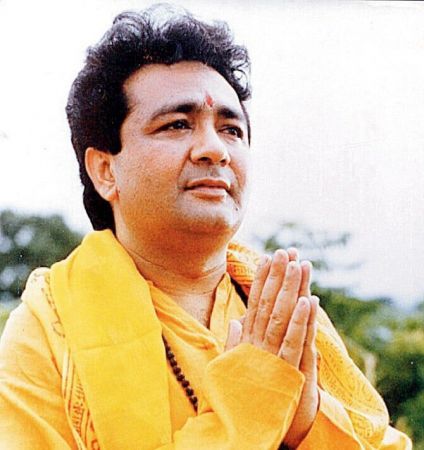
Gulshan Kumar Dua (5 May 1956 – 12 August 1997) was born into a Punjabi Hindu family. He was the son of Chandrabhan Kumar Dua, a fruit juice vendor in Darya Ganj market in Delhi, where he started working early on. While alive, Dua was a devoted worshiper of Shri Shiv Ji and Devi Parvati, as he was a follower of the Shaiva tradition.
Dua changed career paths when his family acquired a shop selling records and cheap audio cassettes, This was the beginning of a vast music empire T-Series music label (Super Cassettes Industries Ltd.), and a Bollywood movie producer. T-Series is now run by his younger brother Krishan Kumar Dua and son Bhushan Kumar. His daughter Tulsi Kumar and Khushali Kumar are famous playback singers.
Gulshan Kumar started his own audio cassette operation known as "Super Cassettes Industries," which turned in to a profitable business. He began a music production company in Noida. As his business started growing, he moved to Mumbai.
His first movie in Bollywood was Lal Dupatta Malmal Ka in 1989. Next was the big hit Aashiqui in 1990 which is remembered for its music by Nadeem–Shravan. His other movies included Bahaar Aane Tak, Dil Hai Ke Manta Nahin, Ayee Milan Ki Raat, Meera Ka Mohan, and Jeena Marna Tere Sang.
During the life of Gulshan Kumar, T-Series emerged as one of the top music labels in India. It continues to be a major label.
Today T-Series controls more than 60% share of the Indian music market. In the international market, T-Series enjoys a turnover in excess of $4.2 million, and exports to 24 countries across six continents. In India, it has the largest distribution network of over 2500 dealers.
Gulshan Kumar Dua was shot dead outside the Jeeteshwar Mahadev Mandir, a Hindu mandir dedicated to Lord Shiva of which he attended daily in Jeet Nagar, Andheri West suburb of Mumbai, on 12 August 1997. Mumbai underworld organization D-Company was involved in the murder. The police also accused film composer Nadeem Saifee of the music duo Nadeem-Shravan of having paid for the murder due to a personal dispute and fled the country after the murder. However, on 9 January 2001, Abdul Rauf Merchant (known as "Raja") confessed to being the murderer. On 29 April 2002, Sessions Judge M L Tahilyani sentenced Rauf to life imprisonment, stating that he was not imposing the death penalty because the prosecution had failed to prove that Rauf was a contract killer. The police allege that Saifee paid Abu Salem, a known associate of Dawood Ibrahim, to assassinate Dua and assigned Rauf to the job, but it just so happened that Ibrahim and Abu Salem were already planning on murdering Dua as he had refused to pay protection money to D-Company as part of an extortion attempt. As per his family's wishes, Gulshan Kumar Dua was cremated in a Shamshan in Delhi.
After the police's allegations against him, Nadeem Saifi had fled to the United Kingdom. In 2001, the case was taken to the London High Court, which rejected the Indian government's request for extradition on the ground that there was no prima facie case against Saifi. In August 2001, the prosecution's main witness, Mohammed Ali Hussain Shaikh, who had earlier claimed Saifi participated in the murder, eventually revealed that he didn't know Saifi and had never seen him. Abu Salem also denied Nadeem's involvement on Indian national television. Saifi was also exonerated by four courts, including the House of Lords in the United Kingdom and the sessions court in Mumbai. Saifi eventually acquired British citizenship, and later moved to Dubai, where he runs a successful perfumery business.